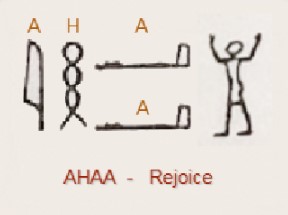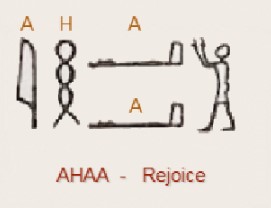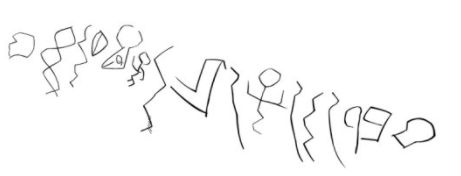|
Hallelujah!
Symbols of Joy, Unity, and Peace in an Ancient Proto-Sinaitic Script.
AL-E-LU! Hallelujah! Rejoice! Praise the LORD! At the heart of the Wadi El Hol 1 inscription lies a Hebrew expression that can be interpreted as profound rejoicing. In the amazingly expressive Proto-Sinaitic language, the letters lamed, heh, lamed both spell a word, and form the picture
of a person kneeling, with their hands up in a gesture of worship. It communicates to the literate, and those who are not educated in letters. The heavens have opened, surrounding the person in a column of divine light. In Egyptian hieroglyphs, heh means eternal. This is a timeless, mountaintop epiphany. Immersed in glory, the rest of the world has faded, leaving the sole illumination: God is light: El e lux. Alelu! God is rendered El or Al, from Hebrew. Luxor: Lux = light, Lux or gold light, Deluxe of divine light? illumination

|

|
|
Adapted from: Budge, Sir E. A. Wallis. (1920, 1978). An Egyptian Hieroglyphic Dictionary. (New York: Dover) pg. 76.
|
The Wadi El Hol 1 inscription of "Hallelu", may be the first
expressed in a alphabetic script in the world. It may be the root of the words "holy, hallowed, halo, hail, and hello.
The symbolic
interpretations illustrate numerous motivations for joy, such as healing, the birth of a child, and victory.
|

O Rapture! Spirit is
caught up to Heaven
in a column of light
Eternal Lord with
sceptres of the
Two Lands:
Heaven and Earth
Life and Death
3 Kings. Trinity
Father Holy Ghost Son
Goddess (Ellah) and
God El. Elah El
god of God - a child
god of gods
Heh al - Praise God
root of Hail Mary
and Hello

Baby cradled at
the breast of
the mother. The joy
of welcoming a child
into the world.
|
|
Hallelu! I'm healed! I jump for joy!
I cast away my canes and crutches!
Free at last! Free at last!
Thank God Almighty! Free at last!
The chains of bondage are broken!
Praise the Lord! I see the light!
I'm inspired by the insight!
Amazing grace!
I am saved! Blessed!
Thankful!
Rejoice! A child is born,
and is cradled in mother's bosom.
Shepherd staffs on either side,
Are loving parents, there to guide.
Victory! I've reached the finish gate!
The race is won!
Now I'll rest by the river,
and enjoy what we've done!
O, Rapture!
A holy soul ascends to heaven.
|

Ahhhh-le-lu-ia!
Shepherd resting
on a blanket
"down by the riverside"
"Ain't gonna
study war no more"
Lord is my shepherd
he leadeth beside
the still waters
Bridge over
troubled waters
L HL Wadi El Hol
|
Masonic symbols - God between two pillars
kneel gates of mystery...
Mary| [neon] | []
The letter gimmel transforms the root Alelu, into the entire word Hallelujah. The gimmel boomerang weapon was the symbol of Canaanite society, which originated Proto-Sinaitic, also known as Proto-Canaanite. The Egyptian hieroglyph for foreign land used a gimmel boomerang, or throwing stick, above three mountains. The cleverness of Proto-Sinaitic, unique in the world, is that the transcendental letter Gimmel rotates like a boomerang. As it turns, it changes meanings!
[ADD ILLUSTRATION]
Flexed like a bicep, it
is an strong arm, meaning mighty, gibbor (Hebrew) or gem (Budge Hieroglyphics p807). The Hebrew word for arm is yud, so it can representing a y, or even a V, vuv for valley. It is a foot, Pt, when erect. It is a tent, with a triangular door, Dalet, when the peak is up.
It means hidden, when the corner is top left. It means a gift, perhaps of incense or bread when the peak is up. It represents the L-shaped man-fish god Dagon or EA, yielding the sound IA in Haleluia.
The Lord of Peace proclaimed in this proposed translation of Wadi El Hol 1
may be the same as the Prince of Peace extolled in the Torah or Bible Old Testament scripture Isaiah 9:6, the inspiration of the magnificent Handel's Messiah and Hallelujah Chorus. In various layers, the remarkable passage yields additional over-tone messages about the nature of god (eternal, mighty, of tents, of Truth, of heaven, of man) and weaves in 10 visual metaphors which express peace and unity. The gyroscopic gimmel represents a jaw, arms, hands, knees, feet, giving, mountains, a valley, and a tent!
All be itself, the mighty gimmel could represent the divine name of YHVH. As an arm, it is yud. As two arms, Waw. It can depict both the knees of the worshipper facing, and divine hands raised in blessing, facing left. As feet indicating presence, it symbolizes another epithet of god, Emmanuel, God with us.
While Wadi El Hol 1, extols the birth of the Messiah, the Prince of Peace, the companion inscription, Wadi El Hol 2, exalts the Mother of Light. (Mother of Great Light, image, divine face of God) Wadi El Hol appears to be a site of the ancient biblical prophecy of Isaiah, engraved on a stone wall.
|






